China Food & Drinks
One of China’s Most Famous Medicines is Made From Hairballs
Some things never get old. Costly Chinese Traditional Medicine like ‘Angong Niuhuang’ are a much discussed and sold item on Chinese websites such as Sina Weibo or Taobao. The much-beloved Chinese medicine, that is also called one of China’s medicinal “treasures”, is quite unique: it is made of the ‘hairballs’ or ‘bezoars’ that occur in the gall bladder of a cow or ox.
Published
10 years agoon
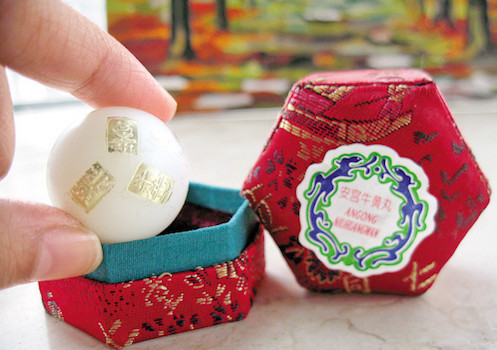
Some things never get old. Costly Chinese Traditional Medicine like ‘Angong Niuhuang’ are a much discussed and sold item on Chinese websites such as Sina Weibo or Taobao. The much-beloved Chinese medicine, that is also called one of China’s medicinal “treasures”, is quite unique: it is made of the ‘hairballs’ or ‘bezoars‘ that occur in the gall bladder of a cow or ox.
For many Chinese families, the ‘Angong Niuhuang Pill’ (安宫牛黄丸) is a household item. The ‘Niuhuang pill’ is known as a “divine medicine” ( Sohu 2012); an effective first-aid medicine against fever or other more serious health problems. Except for treating high fever, the Niuhuang pill is also used for strokes, headaches, dizziness, epilepsy and nausea. In ancient times, it was known as “the pill that could rescue the patient immediately and help revive those who were on the brink of death” (Guo et al 2014, 1). The medicine is believed to have magical healing powers, removing toxins from the human body. The pill, that is known as very rare valuable, comes from an unlikely place.
According to the Chinese Herbs Healing blog, ‘Niuhuang’ (literally: ‘cow gold’) can be found in the gall bladder bile of a cattle or ox. It is usually harvested when the animals are slaughtered, and if some mass is found inside the gallbladder. If so, these ‘hairballs’, or ‘bezoar’, need to be filtered out, dried in the shade, and then grinded into fine powder – eventually processed as the famous ‘hairball’ pill.
The medicine has a long history, as it was already mentioned in China’s oldests texts on medical herbs. In China, the Niuhuang pill is mainly and most famously produced in Beijing. The most well-known version is that of Beijing’s Tongrentang pharmacy (同仁堂安宫牛黄丸).
The Niuhuang pill is not just special because of its origins, but also because of its price. It can become extremely expensive, depending on when it was produced. It is generally believed that the older the medicine is, the more effective it is. This makes the pill an interesting market for frauds, who sell fake ones for enormous amounts of money as if they were authentic. Niuhuang pills from 1993 will be sold for an approximate 1300 yuan (212 US dollars) per pill (Xinhua 2013). Because the price of the natural bezoar is so high, there are somewhat less expensive substitutes that are used more often and widely, such as Tongrentang’s Angong Niuhuang Pill, that is a concentrated powder of the bezoar, mixed with, amongst others, musk, cinnabaris, and gardenia. A box of six pills costs around 130 US dollars.
Another reason to be careful with China’s ‘hairball’ pills, is because of the enormous amount of fake pills circulating in shops and on the internet. On July 30, China’s Shantou Prefecture announced through its official Weibo account that a Guangdong lab where fake Niuhuang pills were being produced was busted by the local police. Four suspects have been arrested. Taking fake pills can potentially be harmful for one’s health.
These online warnings do not withhold Weibo users from buying Niuhuang. One Weibo user called Silver Wind has posted a picture of three boxes containing three ‘hairball’ pills, saying: “These things are so expensive, but much needed!” She later writes that she paid 1600 RMB (260 US dollars) for three pills. Weibo user ‘Wendy‘ writes she is using the expensive medicine not for herself, but to save the little puppies of her dog, who are experiencing some health problems.
Although many netizens trust the efficiency of Niuhuang pills, there are also those who express their doubts with Chinese Traditional Medicine: “Acupuncture, bloodletting, clinics that are like religious services, taking Angong Niuhuang Pills,..what is it all good for? Don’t ask me, because I really don’t know,” one user says.
By Manya Koetse
Follow @WhatsOnWeibo
References
– Guo, Yu, Shaohua Yan, Lipeng Xu, Gexin Zhu, Xiaotong Yu and Xiaolin Tong. 2014. “Use of Angong Niuhuang in Treating Central Nervous System Diseases and Related Research.” Evidence-Based Complementary and Alternative Medicine (2014): 1-9.
– Sohu. 2012. “安宫牛黄丸:错吃就是毒” Sohu News, May 29. http://health.sohu.com/20120529/n344268979.shtml.
– Xinhua. 2013. “十粒“老安宫”一万三 牛黄丸放得越久越值钱?” Xinhua News, July 17. http://news.xinhuanet.com/fortune/2013-07/17/c_125024102.htm [30.07.15].
©2015 Whatsonweibo. All rights reserved. Do not reproduce our content without permission – you can contact us at info@whatsonweibo.com.
Manya is the founder and editor-in-chief of What's on Weibo, offering independent analysis of social trends, online media, and digital culture in China for over a decade. Subscribe to gain access to content, including the Weibo Watch newsletter, which provides deeper insights into the China trends that matter. More about Manya at manyakoetse.com or follow on X.

China Food & Drinks
China Trending Week 11: The Yang Braised Chicken Scandal, Haidilao Pee Incident, Taiwan Tensions
What’s been trending on Weibo and beyond? I doomscrolled Chinese social media so you don’t have to.
Published
3 weeks agoon
March 13, 2025
Here’s the latest roundup of the three top trends and most noteworthy discussions on Chinese social media this week.
🍚🤢Yang’s Braised Chicken Rice Scandal
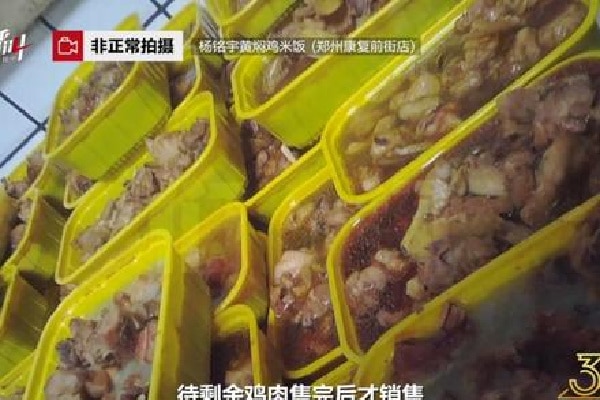
The popular Chinese franchise Yang’s Braised Chicken Rice (杨铭宇黄焖鸡米饭) is at the center of attention this week—for all the wrong reasons. The company, which opened its first restaurant in 2011 and has since franchised more than 2500 locations across China, was exposed by Beijing News for reusing expired ingredients and reselling leftover food in at least three of its restaurants in Zhengzhou and Shangqiu (Henan). Cooks were smoking in the kitchen and even going as far as dyeing spoiled, darkened beef with food coloring to make it appear fresh.
The issue has sparked widespread concern on Chinese social media—not only because Yang’s Braised Chicken Rice is a well-known restaurant chain, but also because food safety and kitchen hygiene remain ongoing concerns in China. The timing of this news is particularly significant, as it was published in the lead-up to March 15—China’s National Consumer Rights Day, an annual event that highlights consumer protection issues.
China’s State Council Food Safety Commission Office has now ordered authorities in Henan and Shandong, where Yang’s Braised Chicken is headquartered, to thoroughly investigate the case. The affected stores will reportedly be closed permanently, but the impact extends far beyond these locations—most netizens discussing the scandal have made it clear they won’t be ordering from Yang’s Braised Chicken Rice anytime soon.
Can the company win back consumer trust? Even though general management has been apologizing and pledged to personally oversee kitchen standards, this is not the first time the company is in hot water. In 2024, a customer in Chengdu allegedly ordered Yang’s Braised Chicken Rice via takeout and discovered a fully cooked dead rat in their meal (picture here not for the faint of heart).
🇹🇼⚔️Beijing Angrily Responds to Lai Ching-te’s Speech: “Pushing Taiwan Towards the Danger of War”
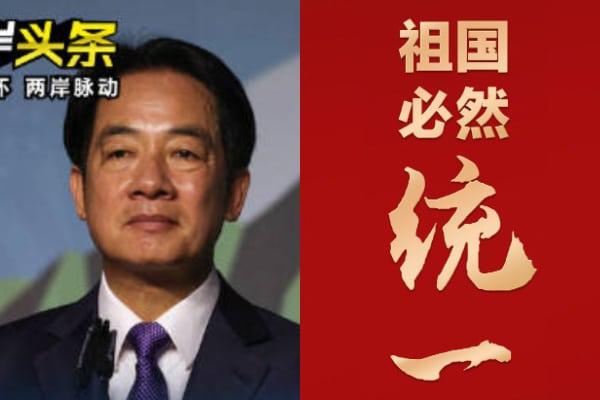
While tough language on Taiwan was already trending last week during China’s Two Sessions, another wave of discussions on Taiwan has emerged this week. This follows a high-level national security meeting held on Thursday by Taiwanese President Lai Ching-te (赖清德), after which he addressed the media and proposed more aggressive strategies to counter Beijing’s so-called ‘united front’ efforts within Taiwan.
On Friday, Beijing responded with stern remarks. Chen Binhua (陈斌华), spokesperson for the Taiwan Affairs Office of the State Council, called Lai Ching-te a “destroyer of cross-strait peace” (“两岸和平破坏者”) and a “creator of crises in the Taiwan Strait” (“台海危机制造者”) who is “pushing Taiwan towards the dangerous situation of war” (“把台湾推向兵凶战危险境”).
Chen also reiterated Beijing’s stance that reunification with Taiwan is inevitable. This message was further amplified on Chinese social media platforms such as Weibo and Douyin through the hashtag “Inevitable Reunification with the Motherland” (#祖国必然统一#).
🔥🚽Haidilao’s “Pissgate”
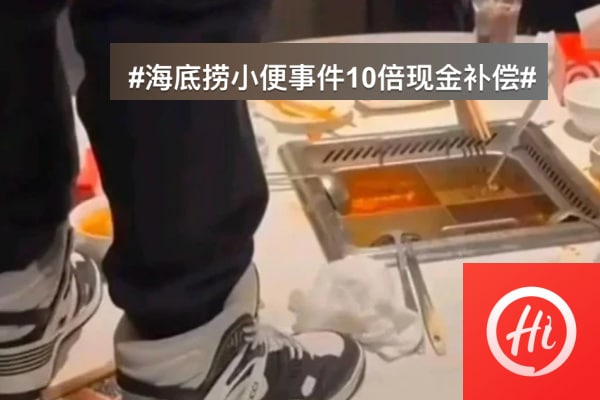
Last week, on March 6, a peculiar news item went viral on Chinese social media, and I tweeted out the viral video here. The footage shows a young man standing on a table in a private dining room at a Haidilao restaurant, seemingly urinating into the hotpot. The incident was later confirmed to have taken place at the popular chain’s Bund location in Shanghai on the night of February 24.
Just when you thought the world couldn’t get any crazier… someone stands up and pisses in the Haidilao hotpot. Blasphemy! Hotpot treason!
Anyway, Haidilao reported the guy to the police, and I’m pretty sure he won’t be welcome back anytime soon. pic.twitter.com/3ytLhGdYjX
— Manya Koetse (@manyapan) March 6, 2025
Honestly, the video seemed staged (the “pee” looked more like water), but understandably, Haidilao was very pissed about the negative impact on its reputation. In case you’re not familiar: Haidilao is one of China’s most popular hotpot chains, known for its excellent service and food quality (read here).
The company immediately launched an investigation into the video’s origins and reported the two men—the one urinating and the one filming—to the police.
This week, the incident gained even more traction (even the BBC covered it) after it was revealed that Haidilao had reimbursed 4,109 customers who dined at the restaurant between February 24, when the incident occurred, and March 8, when all tableware was discarded and the entire restaurant was disinfected.
Not only did Haidilao reimburse customers, but they also compensated them tenfold.
This compensation strategy sparked all kinds of discussions on Chinese social media. While many agreed with Haidilao’s solution to prevent a marketing crisis, some customers and netizens raised ethical questions, such as:
💰If you paid for your meal with coupons and only spent a couple of cents in cash, is it fair that some customers only received 9 RMB ($1.25) in compensation?
💰If you paid for an entire group of friends, meaning you originally spent around $140 on a meal but now received $1,400 in reimbursement, should you split the compensation with your friends?
💰How should cases be handled where a third party made the reservation and ends up claiming part of the compensation?
By now, the incident has become about much more than just pissing in soup.
By Manya Koetse
(follow on X, LinkedIn, or Instagram)
Spotted a mistake or want to add something? Please let us know in comments below or email us. First-time commenters, please be patient – we will have to manually approve your comment before it appears.
©2025 Whatsonweibo. All rights reserved. Do not reproduce our content without permission – you can contact us at info@whatsonweibo.com.
China Food & Drinks
The ‘China-chic Girl’ Image and the Realities of China’s Competitive Food Delivery Market
How did the trendy and cute “China Chic” cartoon image come to symbolize questionable takeout food in China?
Published
2 months agoon
January 25, 2025By
Ruixin Zhang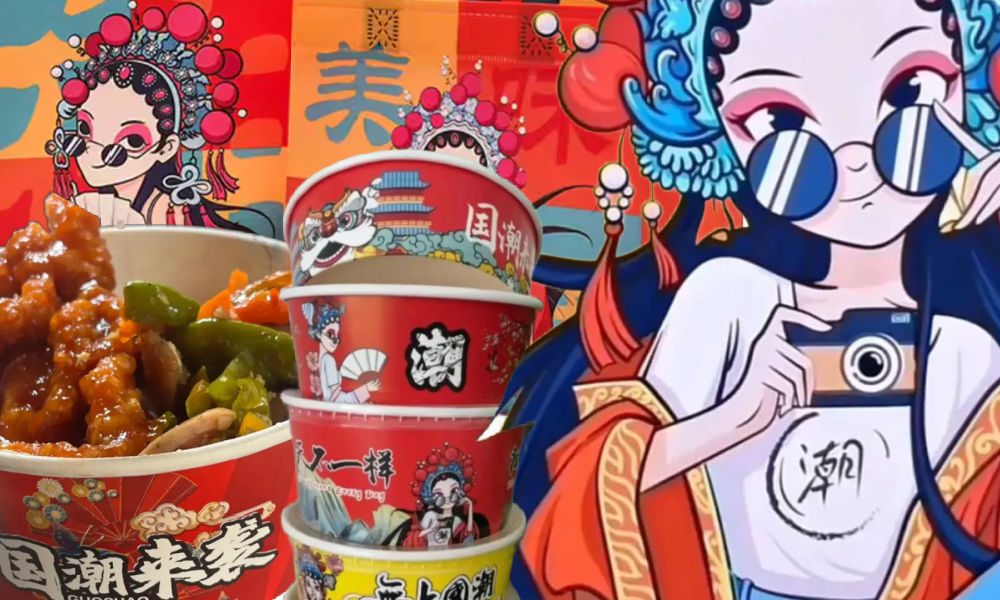
FROM THE WEIBO WATCH PREMIUM NEWSLETTER
“What should we order for dinner?” is a daily dilemma for millions of Chinese consumers in one of the world’s largest food delivery markets. With numerous platforms, cuisines, menus, and discount options, choosing the right takeout—one that is tasty, affordable, and safe—can feel like a daunting task.
But these days, many Chinese people follow a simple rule to identify bad takeout: if your delivery comes in packaging featuring a playful young woman wearing sunglasses, a traditional Peking opera headdress, and holding a fan—often with the bold trendy character “潮” (cháo, meaning “trend”)—it’s likely to be an unhealthy meal with potential food safety risks.

As one netizen joked, “I was so excited for my takeout, only to see this lady on the package and feel my heart sink.” Why does this seemingly cheerful cartoon figure evoke so much distrust and dislike from so many?
China-chic Girl
In 2020, digital illustrator @YUMI created the “China-chic Girl” image in response to a client’s request for a design that embodied the “China-chic” (国潮, guócháo) aesthetic.
China-chic, or guócháo—literally meaning “national tide”—refers to the rise of Chinese domestic (fashion) brands that often incorporate culturally Chinese elements into contemporary designs. This trend emerged as a reflection of growing nationalist sentiment in China, offering a Chinese counterpart to popular Japanese or Korean-inspired styles. From fashion and makeup to milk tea, ‘China-chic’ quickly became a defining element of China’s consumer culture (read more here).
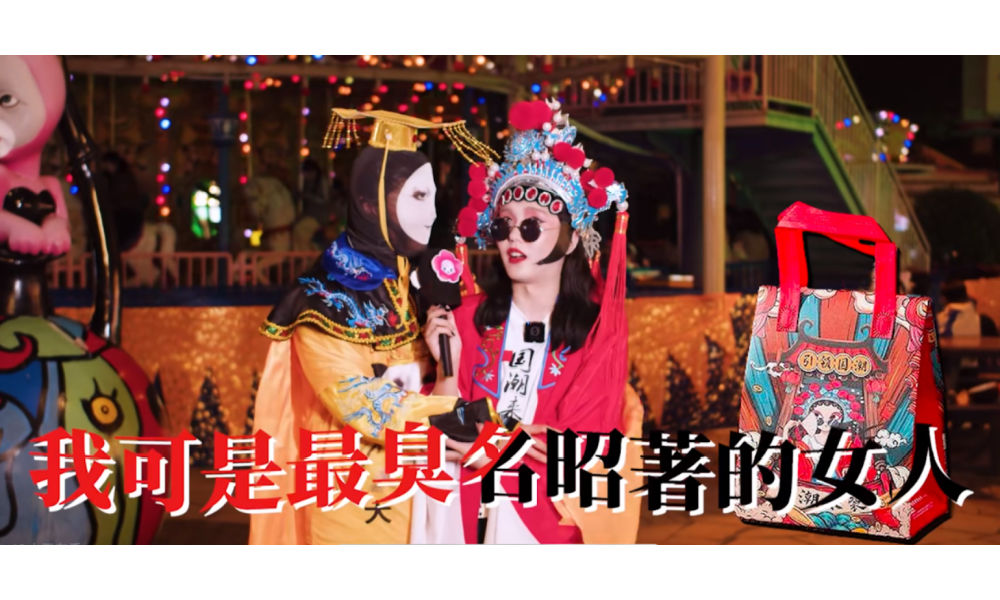
Vlogger @花小雕 dressed up as the “China-chic” girl for Halloween.
However, when YUMI’s client failed to pay, she chose to release the design for free public use. YUMI’s creation—a blend of traditional Peking opera elements and modern sunglasses—struck a chord with its simple yet iconic charm. Its accessibility made it even more appealing, and the China-chic Girl soon became the go-to design for restaurants looking for affordable, visually striking takeout packaging.
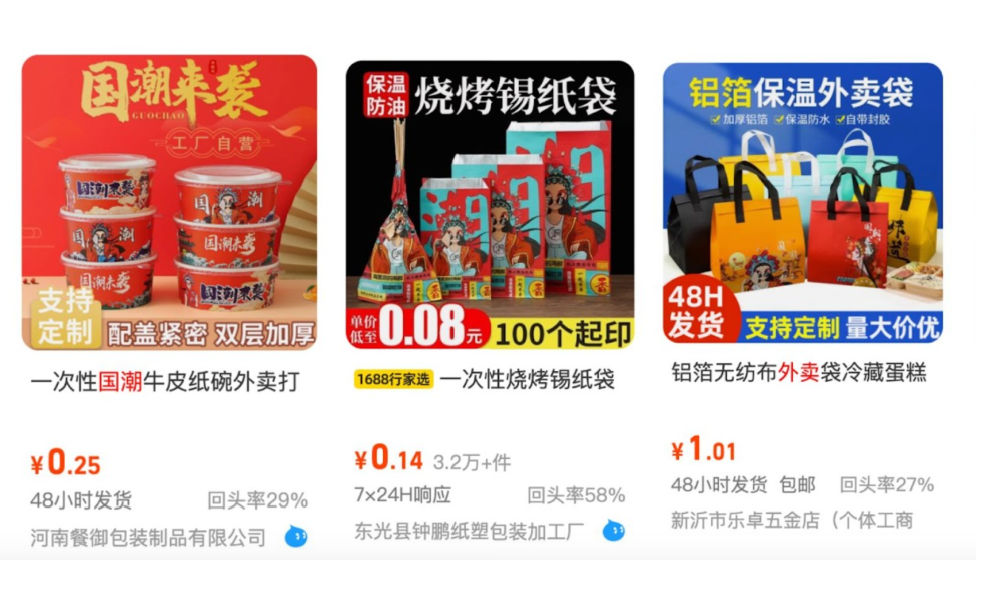
On China’s wholesale website 1688, you can find a wide range of cheap takeout packaging with the “China-chic girl” on it.
The China-chic Girl was all the rage, until last fall.
Starting in September, some delivery drivers began exposing filthy kitchen conditions on social media, warning customers to avoid takeout from certain restaurants after witnessing food safety issues and kitchen hazards while waiting for orders.
Over time, people began noticing a pattern: the dirtiest kitchens were often small, non-chain establishments with no physical storefronts—just cramped spaces dedicated solely to takeout. Operating on tight budgets, these businesses often chose the inexpensive China-chic girl packaging to cut costs, unintentionally associating the China-chic girl with unsanitary and unsafe food practices.
As a result, netizens—especially young people who heavily rely on food delivery—started compiling guides to help each other avoid sketchy takeout options. The warning signs? Restaurants offering “cashback for good reviews” or those that lack a proper storefront, often listing only food items instead of a real restaurant name. These red flags point to private kitchens, poorly managed spaces, or even unregulated food safety practices. Additionally, many of these ‘China-chic takeouts’ thrive within the “group-buying” model on food delivery platforms.
No Such Thing As a Free Lunch
The “group-buying” model, popularized by platforms like Temu and its Chinese counterpart Pinduoduo (拼多多), allows users to invite friends, family, or colleagues to purchase a product together at a discounted price.
This strategy has since evolved into a pseudo-group-buying model, where even without inviting others, the group-buying discount is still applied. These discounts are carefully calculated by platforms to ensure that, even at reduced prices, profits can still be made due to the high sales volume.
Both Meituan (美团) and Eleme (饿了么)—the two largest food delivery platforms in China—have adopted this approach by introducing budget-friendly services such as Pinhaofan (拼好饭) and Pintuan (拼团) to target lower-tier markets.
For example, a typical 30 RMB ($4.15) takeout might cost only half that price through these services, with additional platform coupons and new user discounts making it almost irresistibly affordable.
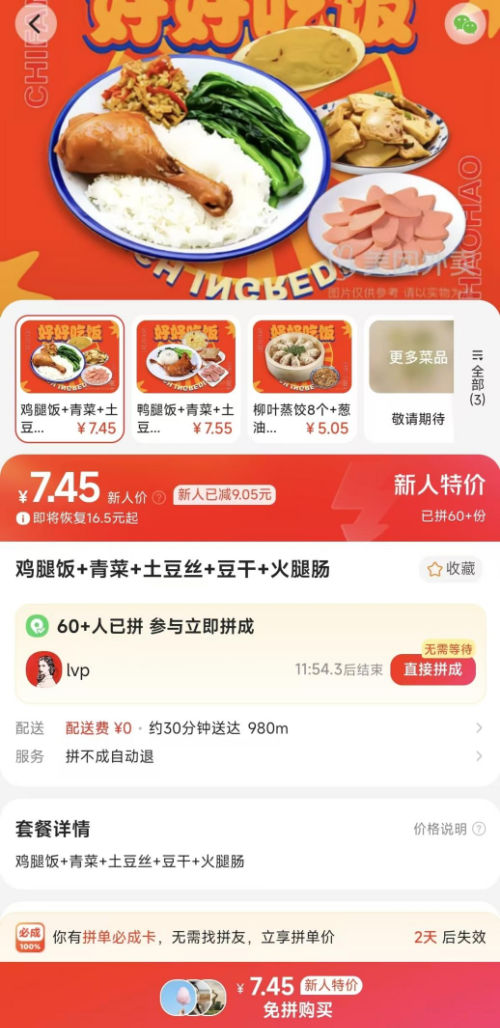
A meal for 7.45 yuan ($1), but how fresh and safe is it?
But, of course, there’s no such thing as a free lunch. As many users have discovered, getting a full meal for under 10 RMB ($1.40) often comes at the expense of quality. These Pinhaofan takeouts commonly feature pre-made dishes with indistinguishable ingredients, flimsy utensils that can’t even scoop rice, a box of suspicious juice full of artificial coloring, low-grade packaging, and, of course, that cheap, once-iconic China-chic design.
A Meme Culture of “Bad Food”
Despite widespread awareness of these issues, the cheap Pinhaofan orders remain incredibly popular. According to Meituan’s second-quarter earnings report, the Pinhaofan service is booming, with order volumes reaching a record high of over 8 million orders per day. Why do people continue to order these potentially unsafe meals despite knowing the risks?
“Low price” has been the keyword for Meituan and the Chinese food delivery market for a long time. In the face of a sluggish economy and rising youth unemployment, online discussions are dominated by concerns over “consumption downgrades” (消费降级), “middle-class poverty” (中产返贫), “youth unemployment” (青年失业率), and “deflation” (通缩).
More and more people are turning to affordable takeout as a quick fix for their everyday struggles, even if the quality leaves much to be desired.
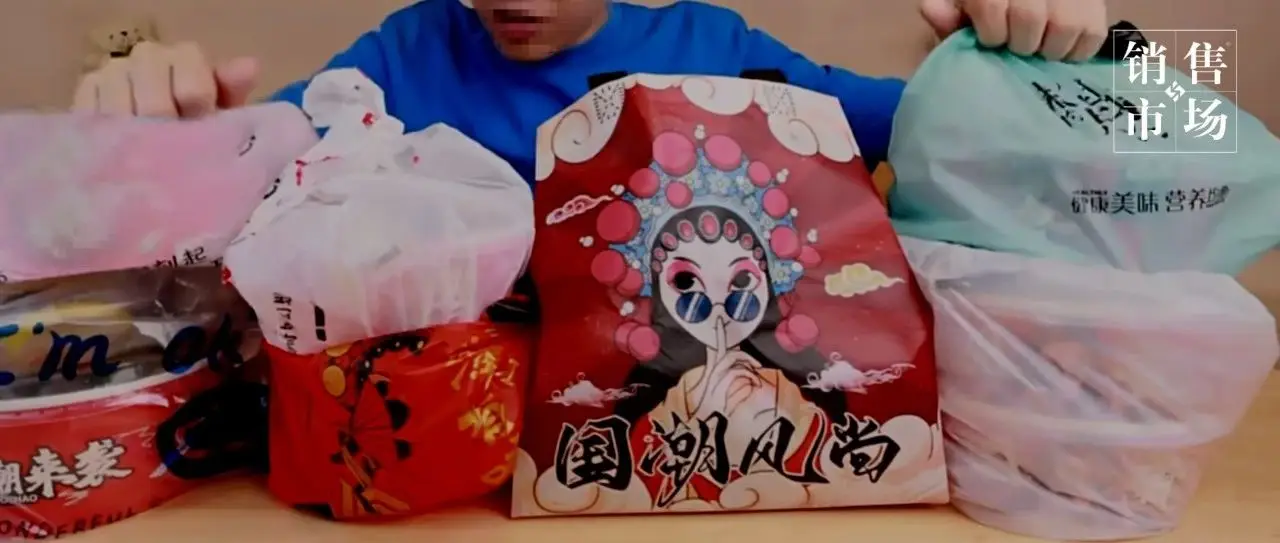
China Chic Girl Takeout
“I’m not stupid; I don’t expect a gourmet feast for 10 yuan ($1.4),” is a common attitude. As wallets run dry and work hours grow longer, health often becomes an afterthought.
This harsh reality, combined with the “lie-flat” mentality embraced by many young people, has turned ‘China-chic takeout’ and ‘Pinhaofan’ into online memes.
These meals have become symbols of resignation and self-deprecating humor among Chinese youth. When someone dares to express dissent or outrage about unchangeable realities—whether personal struggles or broader national policies—they’re often met with tongue-in-cheek pessimistic remarks like, “Have a couple of Pinhaofan meals and you’ll calm down” (“吃两顿拼好饭就老实了”).
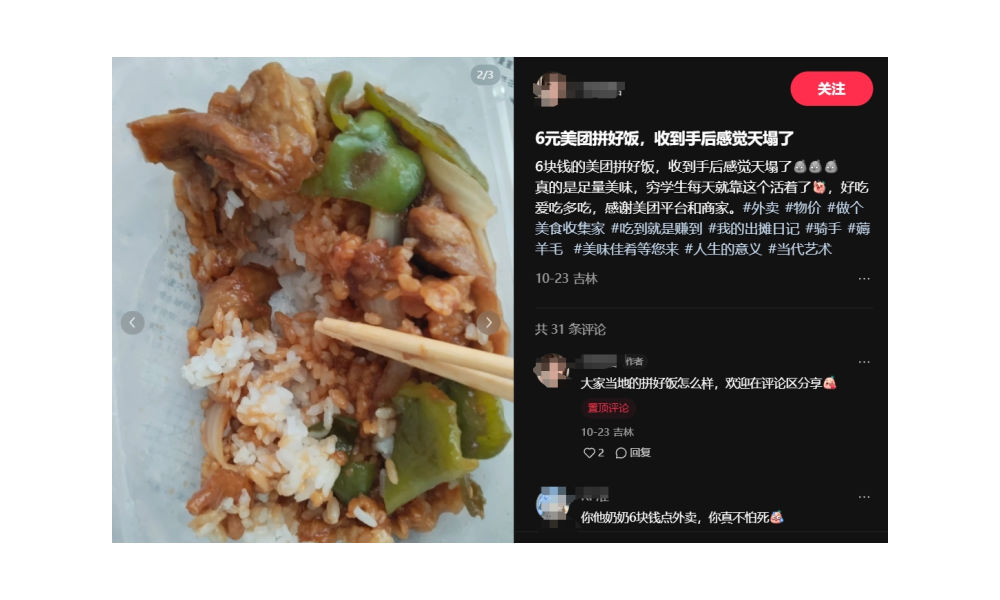
Comparing take-out food: how bad is it actually? There’s a meme culture around Pinhaofan takeout food.
This phenomenon reflects a psychological defense mechanism. For young people who know they cannot change their circumstances, who find themselves at the bottom of society enduring immense hardship—even exploitation—they no longer confront failure directly or refer to themselves using the once-common “diaosi” (屌丝, loser).
Instead, they say things like, “Eating Pinhaofan every day makes me feel like I’ve won in life.” Perhaps it’s a bittersweet acceptance, but it’s not defeat.
No One Benefits—Except the Platforms
While memes can be entertaining, the real-world impact of Pinhaofan is far from positive for most involved—except for the platform giants. According to a report by Zhiwei Editorial Department (@知危编辑部), the Pinhaofan service significantly cuts into restaurant owners’ profit margins. Unlike regular takeout orders, where businesses pay a commission based on the final price, Pinhaofan offers a fixed, much lower payout per order, determined by the platform’s pricing categories. This often leaves restaurants with a meager profit margin of just 2-3 RMB ($0.3-$0.4) per order.
To stay afloat, restaurants are forced to cut corners—replacing fresh meats with frozen ones, opting for cheaper ingredients, and, of course, using the cheapest packaging, often taking the “China Chic” route.
So why do restaurants stick with this model?
The answer is simple: survival. On food delivery platforms, restaurant rankings are usually heavily influenced by factors like operational experience and longevity, giving older, established businesses a visibility advantage. This creates a cycle where newcomers struggle to compete.
The Pinhaofan model changes this dynamic by ranking individual dishes rather than entire restaurants. A single hit dish can boost a restaurant’s overall visibility and sales. In China’s highly competitive food delivery market, platform exposure is everything. Platforms often encourage struggling new restaurants to join Pinhaofan, positioning it as an opportunity to gain visibility. Faced with relentless competition and aggressive price wars, restaurants feel they have no choice but to participate, even if it means compromising on quality and profit.
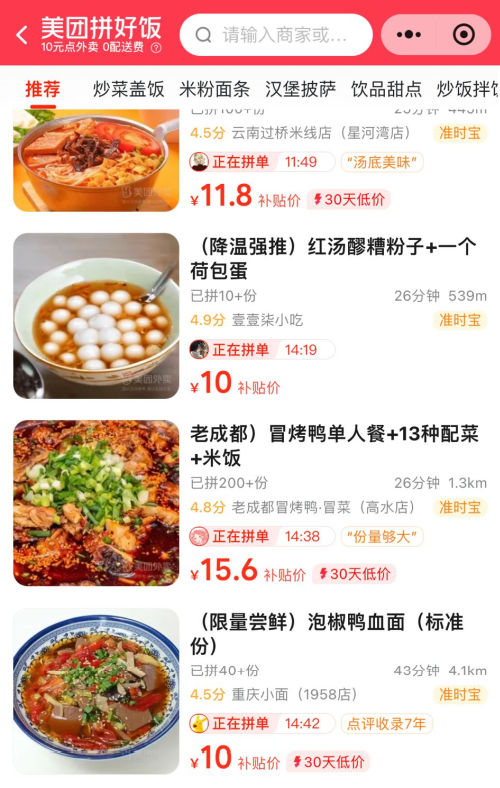
Pinhaofan model: rankings ar based per dish, instead of per restaurant.
For delivery drivers, Pinhaofan presents its own set of challenges. To accommodate its group-order nature, Meituan introduced a “Changpao” (畅跑, or “smooth running”) mode for couriers. Under this system, couriers are assigned multiple Pinhaofan orders—often bundled with regular orders from the same restaurant along the same route—in a single trip, enabling them to deliver 2-3 times the usual number of orders in one go. The promise of “more work, more pay” draws couriers in, but the reality is far less rosy.
As explained by one Chinese blogger (@黑夜之晴天滚雪球), couriers’ per-order income under Changpao is nearly 50% lower than in regular modes. Even with a higher delivery volume, their overall earnings see little improvement. Worse still, regular (non-Pinhaofan) orders included in these bundled deliveries are also paid at the lower Changpao rate.
Couriers have vented their frustrations on social media, labeling Pinhaofan and Changpao as “exploitative.” One courier shared that a single Pinhaofan order earned them just 2.5 RMB ($0.35), and when group discounts were factored in, their earnings dropped to less than 1 RMB ($0.14) per order.
While couriers direct their grievances toward the system, customers are increasingly dissatisfied with the service. Complaints about couriers refusing to deliver Pinhaofan orders upstairs are growing. In some cases, couriers have reportedly even tampered with food to express their anger in a system where resistance feels futile.
For full-time couriers, the situation is even more grueling. Many work seven-day weeks, with at least two mandatory days spent on Changpao mode, leaving them with little choice but to comply with the system’s demands.

Shiba inu having China Chic takeout food. Meme video.
The “China chic girl” has gone from being a playful symbol of pride in domestic products to representing the problems of China’s fast and cheap takeout industry. What once celebrated affordability now highlights cost-cutting, poor quality, and exploitation.
It’s unclear if the memes and discussions around Pinhaofan will eventually bring real change to the situation at hand. But one thing is certain: the once-cute packaging now serves as a reminder of the sacrifices made by customers, restaurants, and delivery drivers in a system that eventually benefits only the platforms.
By Ruixin Zhang
Independently covering digital China for over a decade. Like what we do? Support us and get the story behind the hashtag by subscribing:
edited for clarity by Manya Koetse
Spotted a mistake or want to add something? Please let us know in comments below or email us. First-time commenters, please be patient – we will have to manually approve your comment before it appears.
©2024 Whatsonweibo. All rights reserved. Do not reproduce our content without permission – you can contact us at info@whatsonweibo.com.
Subscribe

Strange Encounter During IShowSpeed’s Chengdu Livestream

IShowSpeed in China: Streaming China’s Stories Well

How K-pop Fans and the 13-Year-Old Daughter of Baidu VP Sparked a Debate on Online Privacy

Squat or Sit? China’s Great Toilet Debate and the Problem of Footprints on the Seat

Weibo Watch: The Great Squat vs Sitting Toilet Debate in China🧻

Our Picks: Top 10 Chinese Buzzwords and Phrases of 2024 Explained

“Dear Li Hua”: The TikTok/Xiaohongshu Honeymoon Explained

Beyond the Box Office: What’s Behind Ne Zha 2’s Success?

Weibo Watch: Christmas in China Is Everywhere and Nowhere

Weibo Watch: A New Chapter

15 Years of Weibo: The Evolution of China’s Social Media Giant

Tuning Into the Year of the Snake

The ‘China-chic Girl’ Image and the Realities of China’s Competitive Food Delivery Market

TikTok Refugees, Xiaohongshu, and the Letters from Li Hua

“Black Myth: Wukong”: From Gaming Screens to the CMG Spring Festival Gala?
Get in touch
Would you like to become a contributor, or do you have any tips or suggestions? Get in touch here!
Popular Reads
-

 China Insight11 months ago
China Insight11 months agoThe Tragic Story of “Fat Cat”: How a Chinese Gamer’s Suicide Went Viral
-

 China Digital10 months ago
China Digital10 months agoChina’s 2024 Gaokao Triggers Online Discussions on AI
-

 China Arts & Entertainment11 months ago
China Arts & Entertainment11 months agoSinging Competition or Patriotic Fight? Hunan TV’s ‘Singer 2024’ Stirs Nationalistic Sentiments
-

 China Arts & Entertainment12 months ago
China Arts & Entertainment12 months ago“Old Bull Eating Young Grass”: 86-Year-Old Chinese Painter Fan Zeng Marries 36-Year-Old Xu Meng

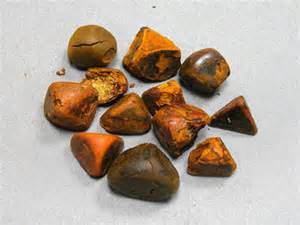

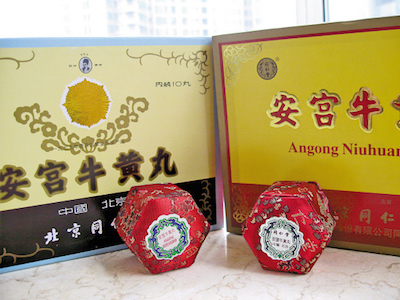
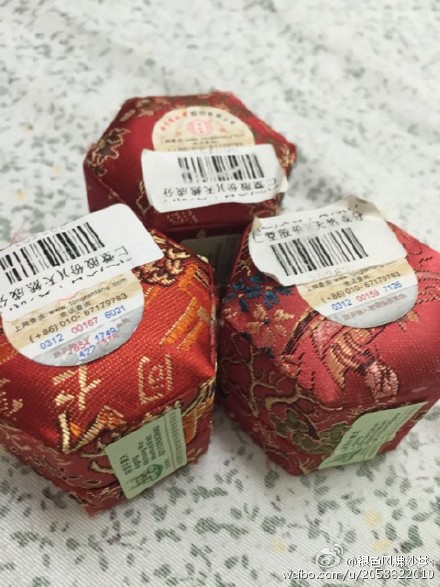






Aiden
May 15, 2018 at 5:31 am
We are certified suppliers of Gallstones worldwide (cows, oxen, bulls, buffaloes, zebus, bison ) with markets in U.S , Europe and Asia we are one of the leading suppliers of Ox Gallstones worldwide.
WhatsApp :+27642338548 or email vvresearchchemicals(@)gmail DOTcom